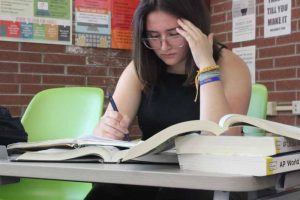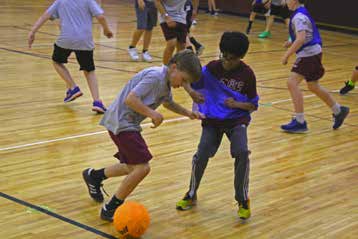Choosing a Healthy SCHOOL-LIFE BALANCE
By Mr. Josh Cogdill, VHS Principal
John Lennon, of The Beatles, is often credited with telling a story of an assignment he received when he was a young boy. ”When I was 5 years old, my mother always told me that happiness was the key to life. When I went to school, they asked me what I wanted to be when I grew up. I wrote down ‘happy’. They told me I didn’t understand the assignment, and I told them they didn’t understand life” (SmartCollegeVisit.com, 2012). At Verona High School, our goal is that each child grows up to have a happy and fulfilling life.
As parents we understand the importance of delaying instant gratification so that more long-terms goals can be achieved. However, we see that student stress and anxiety continues to rise in this country. Reasons for the increased stress include higher expectations to succeed in school, over connectivity on social media, and other pressures of adolescence (Schrobsdorff, 2016). In a recent survey, we asked students at VHS if they felt stressed at school. Of the student who reported feeling stressed, the most commonly cited reasons were high expectations to do well in school and having too many commitments.
 The University of California, Davis, and the University of Texas at Dallas found that students saw “no firm line between their real and online worlds” (Schrobsdorff, 2016). Janis Whitlock, director of the Cornell Research Program on Self-Injury and Recovery said that students are in a “cauldron of stimulus they can’t get away from, or don’t want to get away from, or don’t know how to get away from” (Schrobsdorff, 2016). Students today are connected 24 hours a day, participating in numerous extracurricular activities, and deciding to enroll in rigorous coursework. The constant stimulation gives little time for the students’ mind to rest and process information. So how do we reinforce to students the importance of developing a healthy life-school balance?
The University of California, Davis, and the University of Texas at Dallas found that students saw “no firm line between their real and online worlds” (Schrobsdorff, 2016). Janis Whitlock, director of the Cornell Research Program on Self-Injury and Recovery said that students are in a “cauldron of stimulus they can’t get away from, or don’t want to get away from, or don’t know how to get away from” (Schrobsdorff, 2016). Students today are connected 24 hours a day, participating in numerous extracurricular activities, and deciding to enroll in rigorous coursework. The constant stimulation gives little time for the students’ mind to rest and process information. So how do we reinforce to students the importance of developing a healthy life-school balance?
Verona High School has made strides in helping our students develop healthy expectations. Mrs. Gadaleta, VHS School Counselor, regularly tells students, “to please place a greater emphasis on the quality over the quantity of the things we do”. She goes on to say, “learning how to balance a schedule is a very important skill needed throughout one’s lifetime”. In our 2018-2019 Curriculum Bulletin students and parents are reminded to please consider the student’s commitments and mental health throughout the scheduling process. The VHS Counseling Department believes that students should take courses they are interested in and always consider the time commitment required of each item in the student’s daily schedule.
We regularly hear parents and students say that they have to take specific courses to get into a “good college”. Mrs. Ferlauto, Director of School Counseling says, “there is a college for everyone, and that every student can find the right fit for them”. High school should not be approached through the lens of building a resume. A positive high school experience will allow students to take interesting courses and develop positive peer relationships. Counselors and parents have a responsibility to remind students not to overextend themselves, so they may lead happy and well-adjusted lives in high school.
Ms. DaSilva, VHS School Counselor, encourages students “to remember that as teenager, you should take time to be connected to the present.” Ms. DaSilva went on to say that “students should spend less time comparing themselves to their classmates and more time focusing on becoming the best version of themselves…true happiness and self fulfillment lies in progress of your own journey”.
We believe each parent wants their child to be happy. Please remember that happiness and success are not mutually exclusive. It is our responsibility as parents, teachers, school leaders, and community members to consistently remind students that life is a journey and not a race. There is old fashioned saying, please remember to take the time to stop and smell the roses. Let’s encourage our students to do just that.
Barlow, D. (2001). “Doing school”: How we are creating a generation of stressed out, materialistic, and miseducated students. The Education Digest, 67(4), 74-75. Retrieved from http://library.saintpeters.edu/login?url=https://search-proquest-c om.library.saintpeters.edu/docview/218182727?accountid=28700
Bernstein, J. (2016, January 23). The Rising Epidemic of Anxiety in Children and Teens. Retrieved February 26, 2018, from https://www.psychologytoday.com/blog/liking-the-child-you-love/ 201601/the-rising-epidemic-anxiety-in-children-and-teens
John Lennon’s Take On: What Do You Want To Be When You Grow Up?
http://smartcollegevisit.com/2012/01/john-lennons-take-on-what-do-you-want-to-be-when-you-grow-up.html
Kaufman, J. (2008, May 24). High school’s worst year?; for ambitious teens, 11th grade becomes a marathon of tests, stress and sleepless nights. Wall Street Journal Retrieved from
http://library.saintpeters.edu/login?url=https://search-proquest-c om.library.saintpeters.edu/docview/399061049?accountid=28700
Melman, S., Little, S. G., & Akin-Little, K. (2007). Adolescent overscheduling: The relationship between levels of participation in scheduled activities and self-reported clinical symptomology. The High School Journal, 90(3), 18-30. Retrieved from
http://library.saintpeters.edu/login?url=https://search-proquest-c om.library.saintpeters.edu/docview/220222790?accountid=28700
Schrobsdorff, S. (2016, October 27). Teen Depression and Anxiety: Why the Kids Are Not Alright. Retrieved February 26, 2018, from http://time.com/magazine/us/4547305/november-7th-2016-vol-188 -no-19-u-s



